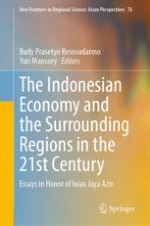2024 | OriginalPaper | Chapter
11. Impact Analysis of the Economic Eastern Corridor on the Thai Economy: An Application of Multi-Regional Input–Output Model and Dynamic Computable General Equilibrium Model
Authors : Nattapong Puttanapong, Kanit Sangsubhan
Published in: The Indonesian Economy and the Surrounding Regions in the 21st Century
Publisher: Springer Nature Singapore
Activate our intelligent search to find suitable subject content or patents.
Select sections of text to find matching patents with Artificial Intelligence. powered by
Select sections of text to find additional relevant content using AI-assisted search. powered by
